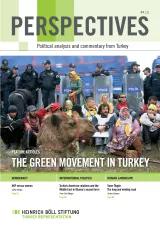Perspectives Turkey 4/2013: The green movement in Turkey
The April issue of Perspectives takes up the environmental movement in Turkey. It originates in the Ottoman times, with the first protests against the “urban renewal” projects between 1912 and 1919. We understand that the history of the movement is an inseparable part of Turkish political history shaped by military coups. The political pressure affected and weakened the organizational attempts of the civil society.
The goal of the present government to build a nuclear power plant was already one of the main issues of the environmental movement in the 70s. Like every other struggle in this area, the anti-nuclear campaign continues despite violations of law, aiming the actual formation of a state of law. We examine how legal boundaries and regulations were breached, which institutions neglect their duties and that this movement has therefore to struggle for the rule of law. The questions brought up by the anti-nuclear campaign in the 70s, ÇED (Environmental Impact Assessment reports) not being prepared according to the regulations, cooperation between the public and the private sector and the lack of coordination between institutions are still valid today, reflecting some of the common features of all the movements fighting for democratization.
Some essays in this issue consider the Green Party (Yeşiller Partisi), which was born out of the environmental movement, examine the extent to which the Greens are influenced by the legal constraints imposed upon political parties, and discuss green policies in connection with social conditions. Some may argue that the Green Party is mainly concerned with future risks and cannot suitably address current problems while others argue its agenda could actually improve people’s quality of life today and could therefore garner broad popular support.
The environmental movement must be seen as a movement aimed at establishing the rule of law and in this regard, its contribution to society cannot be underrated. The protests against hydroelectric or nuclear power plants are not only concerned with future generations, but also with present day society. In developing countries, it’s commonly held that alternative development models clash with society’s desire for welfare. But even in developed countries environmental movements face similar arguments. It is up to us to convince society at large on the great importance of the environmental movement for both our present and future quality of life. Serkan Ocak’s essay on the radioactive dump site in İzmir successfully demonstrates that being concerned with environmental issues is not a “luxury” of the upper classes; on the contrary, the environmental movement has an important impact on the lives and living conditions of the lower classes.
It is no surprise to us then that most environmental activists are members of local organizations. Local activists take action to solve local problems, but it is not easy for them to make themselves heard nationwide. Since issues regarding democratization and the rule of law underlie all environmental problems, those who struggle for democracy, for the consolidation of the rule of law and for the protection of the environment should stand side-by-side in support of one another.
In addition, many politicians belittle the environmental movement, in part because they accept the existing development paradigm as true, and in part because they are insufficiently informed about sustainable development. This attitude may also be a strategy that enables them to focus on what they consider as “more important” issues. But the Fukushima “accident” proved that such a strategy could only be valid in the very short term.
Those who point out the risks involved in such short-term strategies are discredited in the eyes of the public as being pawns of foreign enemies whose goal is to impoverish the nation, and to prevent the nation’s society from sharing in the national wealth. These kinds of false accusations only serve to undermine the legitimacy of the environmental movement.
“A different life is possible.” It is evident that we still need to discuss extensively the impacts such a vision might have on society. The wealthy have the means to escape from air pollution, traffic congestion and other problems. The poor, however, often have no escape from working and living in unhealthy conditions. Today, the environmental movement continues its struggle to overcome these problems.
The environmental movement and its actions concern us all. We hope that with this issue we can impress upon our readers that the environmental movement cannot be thought of separately from the struggles for gender equality and democracy.
On behalf of the Perspectives team
Ulrike Dufner
